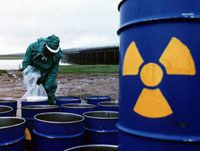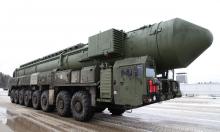Illegal radioactive wastes kill Russians
Russian town Chapaevsk, situated in Samara region, dies off. For several decades there have been produced warfare toxins. As a result for the last 15 years the population of the town has decreased in a quarter. The soil and ground waters are filled with dioxins and other poisons. People die from tuberculosis, throat and liver cancer.

In the 20th there has been constructed a secret plant that would produce the inside part of chemical weapons: sulphur mustard and lewisite. During World War II the chemicals were produced 24 ours a day and all the wastes were dumped into the near river and canals.
After the war the factories continued to produce chemical weapons, projectiles and explosives, which badly damaged the ecology of the town. Since early 90th the defense plants haven’t been producing anything. Soon the chemical plant was also closed down. However even today the citizens find chemical projectiles with strange stinky liquid leaking out of it. The town is situated on the bank of the river Chapaevka, all the wastes have been dumped there, so as a result the river doesn’t meet any ecological demands.
Local authorities don’t conceal the problem. Some days ago the town mayor Nikolai Malakhov proposed the town liquidation as an ideal solution to the problem.
He was talking about 2 ways how to save the citizens’ health: either to recultivate the soil, or to transport all the citizens to ecologically favorable place. Both ways demand great sums of money. The transportation of the citizens of 580 houses will cost about 82 million dollars. Only the State budget can sponsor this plan. In addition, it is the State authorities that need to come over with the transportation schemes.
The second way is the soil recultivation. This program is slowly going on. Again, the main problem is lack of money. The project hasn’t been sponsored for 3 years.
But the first priority is the construction of water-cleaning complex. It is also necessary to clean the territory of the chemical plant and to transport the citizens of the near houses away from the poisoned area. The level of the town’s chemical pollution is threatening for people’s lives. Only small areas can be inhabited. However, despite the serious threat, the town citizens don’t want to leave their homes.
Sergei Baranovsky, the head of Russia’s Green Cross, states that the problem of illegal chemical weapon dumping really exists. In late 50th, when the wastes were dumped, nobody thought about ecology and the threat to nature. It is only today that the chemical weapon is destroyed under the strict control of scientists. In the past the weapon was burned in the open air, dumped into rivers or buried in the soil.
The town of Dzerzhinsk is also buried in radioactive wastes. The town has several plants that produce chemical weapon. Inside these plants the radioactive wastes rate is 10 times higher than the maximum concentration limit (MCL). To make things worse, one of the town ponds is completely sopped with poisonous wastes.
The village Leonidovka that is 12 miles away from Penza is situated close to the chemical armory. Near it there is a lake Mokhovoe that has no living creatures in it. Several years ago armymen buried there overaged weapon – bombs with sulphur mustard and lewisite. Until recently this information was classified and many people swam in the lake each summer. In spring when the ice melts streams from the lake run to the main source of water for the citizens - Sursky reservoir.
Krasny Bor, situated just 18 miles away from Saint Petersburg, is also notorious for the amount of poisonous wastes buried there. This huge radioactive dump presents a serious danger for the citizens of the nearby towns.
Back to Chapaevk, Green Cross head said it’s improbable that the town will be liquidated. The place needs to be thoroughly cleaned, although this requires greater sums of money.
The president of Russian green Cross underlined that that environmental problems need to attract the attention of the society. All the problems concerning the health of the people need to be discussed and solved in all levels of the government.
Translated by Lena Ksandinova
Subscribe to Pravda.Ru Telegram channel, Facebook, RSS!





